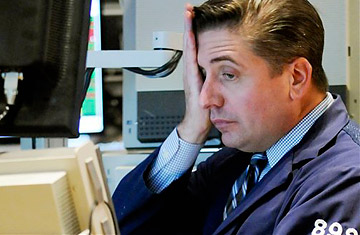
Specialist Thomas Laughlin works at his post on the floor of the New York Stock Exchange.
(3 of 3)
2 Stem the tide of foreclosures. The original Paulson plan is like a massive blood transfusion to a patient with severe internal hemorrhaging. We won't save the patient if we don't do something about the foreclosures. Even after congressional revisions, too little is being done. We need to help people stay in their homes, by converting the mortgage-interest and property-tax deductions into cashable tax credits; by reforming bankruptcy laws to allow expedited restructuring, which would bring down the value of the mortgage when the price of the house is below that of the mortgage; and even government lending, taking advantage of the government's lower cost of funds and passing the savings on to poor and middle-income homeowners.
3 Pass a stimulus that works. Helping Wall Street and stopping the foreclosures are only part of the solution. The U.S. economy is headed for a serious recession and needs a big stimulus. We need increased unemployment insurance; if states and localities are not helped, they will have to reduce expenditures as their tax revenues plummet, and their reduced spending will lead to a contraction of the economy. But to kick-start the economy, Washington must make investments in the future. Hurricane Katrina and the collapse of the bridge in Minneapolis were grim reminders of how decrepit our infrastructure has become. Investments in infrastructure and technology will stimulate the economy in the short run and enhance growth in the long run.
4 Restore confidence through regulatory reform. Underlying the problems are banks' bad decisions and regulatory failures. These must be addressed if confidence in our financial system is to be restored. Corporate-governance structures that lead to flawed incentive structures designed to generously reward ceos should be changed and so should many of the incentive systems themselves. It is not just the level of compensation; it is also the form — nontransparent stock options that provide incentives for bad accounting to bloat up reported returns.
5 Create an effective multilateral agency. As the global economy becomes more interconnected, we need better global oversight. It is unimaginable that America's financial market could function effectively if we had to rely on 50 separate state regulators. But we are trying to do essentially that at the global level.
The recent crisis provides an example of the dangers: as some foreign governments provided blanket guarantees for their deposits, money started to move to what looked like safe havens. Other countries had to respond. A few European governments have been far more thoughtful than the U.S. in figuring out what needs to be done. Even before the crisis turned global, French President Nicolas Sarkozy, in his address to the U.N. last month, called for a world summit to lay the foundations for more state regulation to replace the current laissez-faire approach. We may be at a new "Bretton Woods moment." As the world emerged from the Great Depression and World War II, it realized there was need for a new global economic order. It lasted more than 60 years. That it was not well adapted for the new world of globalization has been clear for a long time. Now, as the world emerges from the Cold War and the Great Financial Crisis, it will need to construct a new global economic order for the 21st century, and that will include a new global regulatory agency.
This crisis may have taught us that unfettered markets are risky. It should also have taught us that unilateralism can't work in a world of economic interdependence.
Going Forward
The next U.S. President will have a very hard time of it. Even the most well-thought-out plans may not work as intended. But I am confident that a comprehensive program along the lines I have suggested — stemming foreclosures, recapitalizing banks, stimulating the economy, protecting the unemployed, shoring up state finances, providing guarantees where needed and appropriate, reforming regulations and regulatory structures and replacing regulators and those with responsibility to protect the economy with those focused more on rescuing the economy than on rescuing Wall Street — will not only restore confidence but in due time also enable America to live up to its full potential. Halfway approaches, on the other hand, by continually bringing disappointment, are sure to fail.
In a country where money is respected, Wall Street's leaders used to have our respect. They had our trust. They were believed to be a font of wisdom, at least on economic matters. Times have changed. Gone is the respect and trust. Too bad, because financial markets are necessary for a well-functioning economy. But most Americans believe that Wall Streeters are more likely to put their interests ahead of those of the rest of the country, dressing it up in as fancy language as necessary. If the next President is seen to have his policies unduly shaped by Wall Street and those policies don't do the trick, his honeymoon will be short. That will be bad news for him, for the country and for the world.
Nobel laureate Stiglitz is University Professor at Columbia University. He was chief economist of the World Bank and chairman of President Clinton's Council of Economic Advisers
